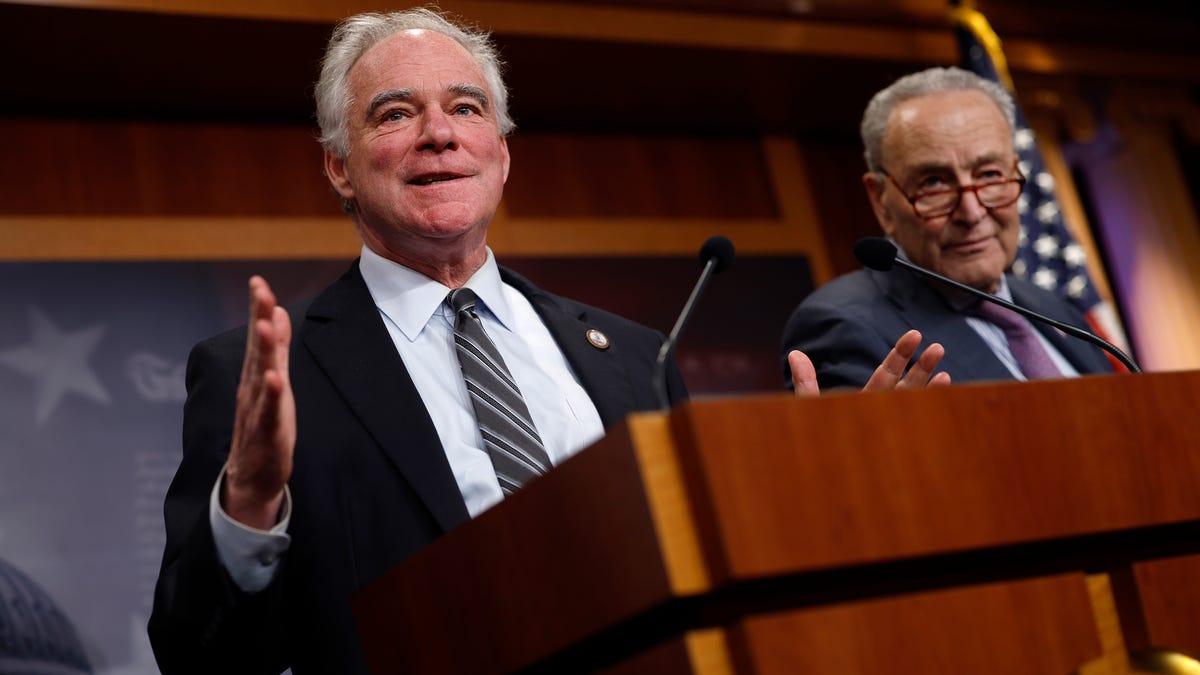Donald Trump set to announce new tariffs on April 2
U.S. President Donald Trump has been calling April 2nd ‘Liberation Day’ for weeks. It’s the day he’ll be unveiling an array of new tariffs that could upend the global trade system.
WASHINGTON – Fifty-one senators, including four Republicans, voted on Wednesday to end President Donald Trump’s tariff on Canadian goods in a bipartisan rebuke of the administration’s trade policy.
It comes just hours after Trump implemented 10% across-the-board tariffs on imports and additional reciprocal tariffs on goods from 60 countries, a significant escalation in the global trade war. The vote marks the first substantive bipartisan pushback to Trump’s policies since he took office just over two months ago.
The resolution put forward by Sen. Tim Kaine, D-Va., would end an emergency order Trump declared in February over concerns about fentanyl crossing the northern border with Canada. That order has been used as the basis for 25% tariffs on Canadian goods.
It would need to be approved by the Republican-controlled House and be signed by the president in order to have an effect – so it has almost no chance of actually changing U.S. policy. But the bipartisan statement reflects widespread discomfort, even among some Republicans, with a trade policy that economists say will raise prices for consumers.
Democrats have argued that the tariffs will be devastating for the U.S. economy, pushing up consumer prices and depressing trade.
“The average American family will pay more than $5,000 out of their pocket to pay for these tariffs,” Senate Minority Leader Chuck Schumer, D-N.Y., told reporters Wednesday. “Why would Trump do this? One reason: He wants to take the money that he gains from tariffs to give tax cuts to billionaires.”
Republican Sens. Rand Paul and Mitch McConnell of Kentucky, Susan Collins of Maine and Lisa Murkowski of Alaska joined Democrats in voting against the president’s tariffs on Canada.
The four GOP senators are a cohort that have clashed with Trump in the past as they voted against some of Trump’s key Cabinet nominees. Paul also voted against a Republican government-funding extension. Trump called them out in a Truth Social post early Wednesday morning, urging them to “get on the Republican bandwagon, for a change.”
“Every business interest in my state says we don’t want tariffs,” Paul said. “Tariffs on Canada will threaten us with a recession. It’s a terrible, terrible idea.”
He added that the Republican Party has suffered politically every time it has supported tariffs. When Republicans in Congress and the White House passed the Smoot-Hawley Tariff Act in the 1930s, he said, “they were decimated for 60 years. Republicans did not control the House and Senate for 60 years.”
While the overwhelming majority of Senate Republicans stuck with Trump on the vote, the four dissidents’ frustration with the president’s tariffs reflect unease about tariffs among their many in their party, who fear potential price hikes.
“I think there’s uncertainty, leading to concern, of what effect (tariffs) might have on the prices of cars or goods or inputs to business,” said Sen. Shelley Moore Capito, R-W.V. “So I am worried about that. But I also think we have been treated unfairly a lot of times in our trading protocols and we need to be treated equally.”
However, most Republicans voted against the resolution, citing concerns about fentanyl coming into the United States – the basis of the emergency order Trump has used to justify the previously announced tariffs against Canada, Mexico and China.
“What will happen if we focus on fentanyl coming across the southern border and from China but fail to address the northern border component of this crisis?” said Senate Majority Leader John Thune, R-S.D., on the Senate floor Wednesday. “Will the cartels simply shift tactics and expand their operations to the north? I think we can be confident the answer to that question is yes.”
Officials have seized less than 1.5 pounds of fentanyl at the northern border so far this year, according to Customs and Border Protection, and seized around 50 pounds last year. In comparison, more than 20,000 pounds were seized at the southern border in 2024.
Sen. Elissa Slotkin, D-Mich., said the administration’s tariffs are creating “a level of instability and uncertainty” for businesses “that is akin to this exact moment five years ago with COVID.”
She said a Trump voter struck up a conversation with her at a gas station back home in Michigan, and told her he’s concerned Trump will be a “yo-yo” on tariffs.
“So I think Michiganders understand the impact,” Slotkin said. “And my Republican colleagues will say it softly, in a quiet voice.”
“But it’s a culture of fear and it’s affecting everybody I know,” she added, referring to the risk of blowback among Republicans for publicly speaking against the president. “They don’t want to stick their neck out.”
